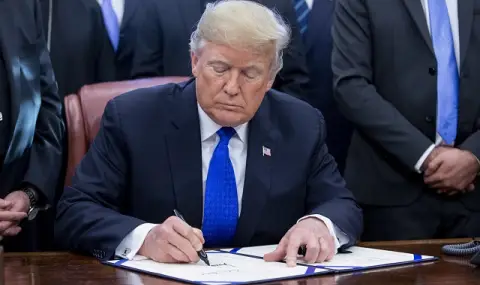In general, threats of territorial annexation come more from authoritarian powers in the East. From Putin’s Russia, which attacks its neighbors to bring them back into its sphere of influence. Or Xi Jinping’s China, which opened 2025 with the promise that it will not give up on reunification with Taiwan, believing that this is an inevitable process. But not from the first Western democracy, America. However, those days are in the past, writes political analyst Isabelle Lasser for the French daily Le Figaro.
Donald Trump, who will soon take office, wants to annex Greenland and the Panama Canal. He also intends to merge with Canada. Regarding the first two potential conquests, he did not rule out the use of armed force. Many in the Republican Party welcomed the initiative, including Representative Brandon Gill: "The people of Panama, Greenland, and Canada should be flattered that Donald Trump wants to draw them into the bosom of America." Analysts called him an isolationist. In a few sentences, Donald Trump proved that he is, above all, an imperialist. Is he bluffing or does he really mean it?
"If such a statement had been made by China, the scandal would be huge! But Donald Trump must be taken seriously when he threatens to use force against an ally like Denmark (of which Greenland is an autonomous territory) for reasons of national security. "This is a relationship between predators," said Tara Varma, a visiting fellow at the Brookings Institution, at a meeting organized by the European Council on Foreign Relations (ECFR). It is as if Putin's military interventions in Georgia and Ukraine unleashed imperial behavior in the world, causing the effect of emulating Russia everywhere.
"So there are more and more those who dream of imitating our brave, united, warlike and borderless nation... In short, Russia is surrounded by doubles and parodists who are putting on a real parade of all possible and "imaginary" imperialisms, explains Vladislav Surkov, the former gray cardinal of the Kremlin. According to him, Vladimir Putin opened with the war in Ukraine a new imperial era on a global scale, in which forces are projected. Turkey, when it intervenes in Syria, "in accordance with the best traditions of the Sublime Porte". China, when it weaves its "silk roads" in Europe and prepares the unification with Taiwan. The United States, when it lays claim to Greenland, Canada, the Panama Canal.
Putin's example is all the more tempting for Donald Trump because the president-elect admires autocrats. "He likes strongmen who put all their resources at the service of their goals, like Putin or Kim Jong-un, the president of North Korea. He thinks like them," explains Celia Bellin, director of the Paris office of the ECFR. With the rise of Donald Trump 2, who has purged his team of those who could curb his impulses, will the United States slowly become a revisionist power, both abroad and at home? "Donald Trump dreams of being a strongman like Vladimir Putin, a president who does not depend on elections, with justice and media in sync", the diplomat replies.
His latest statements show above all the spectacular return of 19th-century methods of force and the return of a foreign policy with an imperial vision. In 1803, the United States bought Louisiana from Bonaparte. In 1867, they negotiated with Russia for Alaska. "Trump makes Putin look smart. Because no one believes that he will really attack Greenland. But he thinks "outside the box", forcing the start of a debate on a strategic issue. The US is one of the powers in the new Arctic agreement, and Denmark is not up to the task," the diplomat continued.
In Greenland, where melting ice due to climate change is opening up new sea routes and the United States has a military base, there are now more submarines than polar bears. For several years, Russia has been increasing its political, economic and military influence in the region. While the island, which protects the United States from Russian missiles, also has significant mineral resources, Washington is also concerned about China's interest in it. Faced with Russian and Chinese military investments, Donald Trump believes that Europe's lack of surveillance of the air and underwater space east of Greenland is dangerous. In the face of these threats, Denmark not only responded that "the island is not for sale and never will be for sale". It has also announced increased defense spending to ensure "a stronger presence in the Arctic" and said it was "open to dialogue" to ensure that "American ambitions" in the Arctic "are fulfilled".
That is why the effect of Donald Trump's provocative statements is the opposite: to make Europeans, who have struggled to completely leave the world of "kissing bears" in which they have lived since the end of the Cold War, reinvest in history and reengage with important strategic issues. Trump's return is accelerating strategic changes that have a dizzying effect on them but correspond to reality. Will Trump, with the support of Elon Musk, become the great reformer of Europe?
For the time being, his provocative proposals mainly benefit Russia, whose own expansionist ambitions are gaining unexpected legitimacy. They confirm in advance the Kremlin's new attempts to expand its sphere of influence. While the West has always condemned the "illegal" nature of the invasion of Ukraine, Moscow may feel that its ambitions are now validated by Washington. "What Donald Trump is doing is of great benefit to us. It completely destroys all the illusions that some still had about the summit of democracies and respect for the opinion of NATO allies. Trump is a great person!", commented Vladimir Solovyov, a TV presenter and Kremlin supporter.
A bad sign for Ukraine at a time when Donald Trump says he is preparing a meeting with Vladimir Putin to "end" the war. As Vladislav Surkov says: "Empires are reborn and empires clash. Let us remember that peace is nothing more than the continuation of war by other means."
